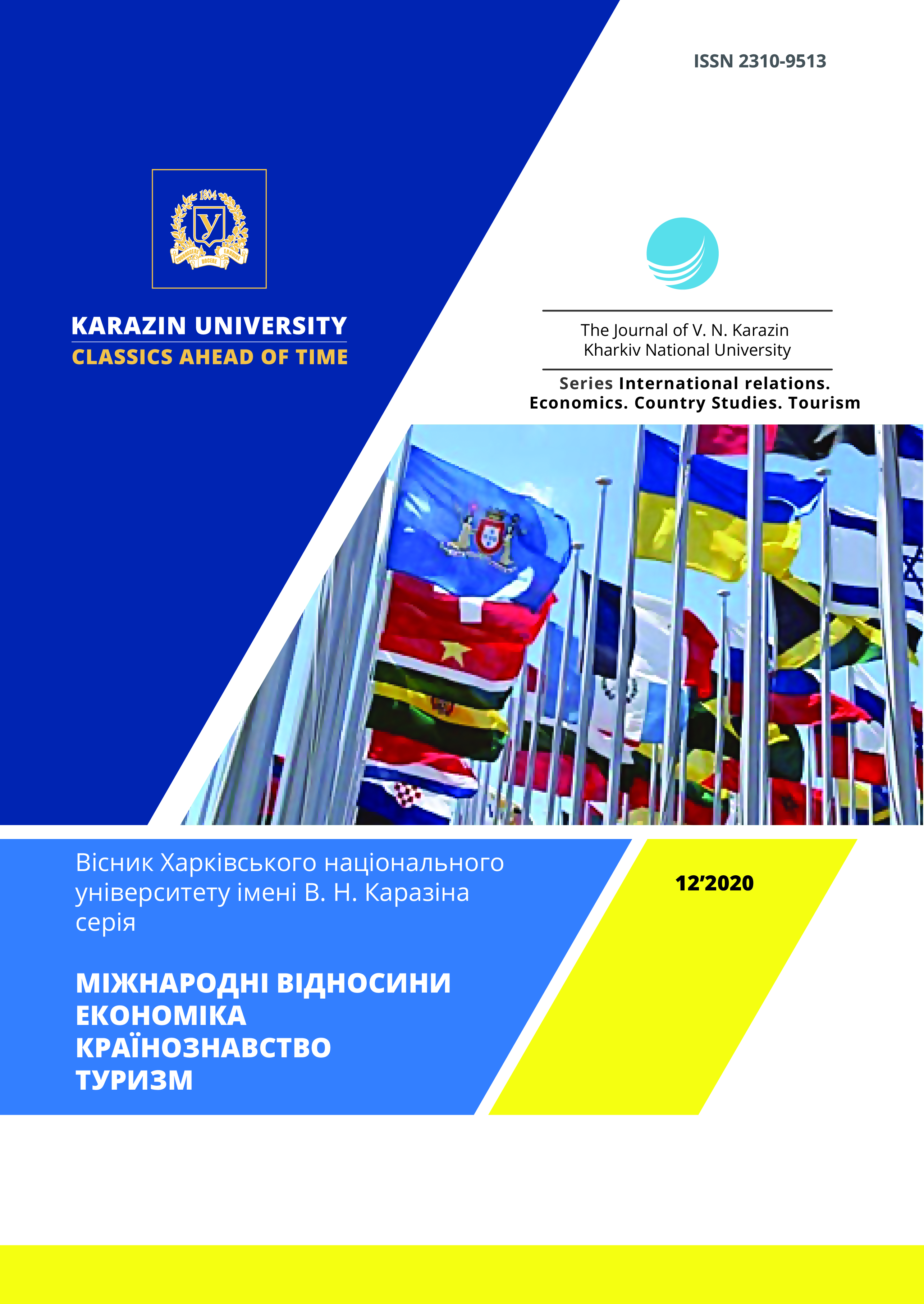«Nord stream-2» as a mechanism of Russian economic influence on the policy of the European States
Abstract
The article analyzes political aspects of construction Russian pipeline Nord Stream-2 and its influence on relations between EU member states and the Russian Federation. During the research, it was in detail analyzed the impact of the Russian capital on the process of foreign policy decision making by European governments. The article proves, that the Russian pipeline Nord Stream-2 is not economic, but the politically motivated project. The subject of research of the article is increasing the dependence of EU member-states from Russian influence as a result of construction Nord Stream 2, which is one of the elements of the hybrid policy of the Russian Federation, aimed against EU and NATO member states. The purpose of the article is to analyze the mechanism of the Russian energy influence on the policy of the European states, to reveal threats for the energy security of the European continent, and the impact of economic ties on policy-making of the states regarding Russian aggressive policy. The research describes, how Russia enhances the dependence of European states from natural gas and oil supplies, that appears in the strengthening of Russian political role in Europe. Special attention is paid to the impact of Nord Stream-2 on French and German position on Russia`s military aggression against Ukraine. This research allows in detail to study the problem, to analyze threats in purpose to develop an effective mechanism of countering this energy threat. The research activity of this nature may be useful for forming the strategy of saving the status of the transit state of Ukraine and the development of the dialogue with partner states in the context of the construction of the security system and countering Russian influence.
Downloads
References
Center for Strategic and International Studies. (2016). The Kremlin Playbook: Understanding Russian Influence in Central and Eastern Europe. Available at: https://csis-prod.s3.amazonaws.com/s3fs-public/publication/1601017_Conley_KremlinPlaybook_Web.pdf
New Europe Center. (2018). Atrofiia trofeiv. Yak Ukraina mozhe skorystatys vrazlyvymy storonamy rosiiskoi polityky u YeS? Tsentr «Nova Yevropa». [Atrophy of trophies. How can Ukraine take advantage of the vulnerabilities of Russian policy in the EU?]. Available at: http://neweurope.org.ua/analytics/atrofiya-trofeyiv-yak-ukrayina-mozhe-skorystatys-vrazlyvymy-storonamy-rosijskoyi-polityky-u-yes/#_ftn1 (in Ukrainian)
Reuters. (2020). Macron defends closer dialogue with Russia, sees no alternative. Available at: https://www.reuters.com/article/us-germany-security-macron-russia/macron-defends-closer-dialogue-with-russia-sees-no-alternative-idUSKBN2090CT
The European Center of Excellence for Countering Hybrid Threats. 2019. Assessing Energy Dependency in the Age of Hybrid Threats. Available at: https://www.hybridcoe.fi/publications/assessing-energy-dependency-in-the-age-of-hybrid-threats/
Institute for Energy Strategy. (2003). Energeticheskaya strategiya Rossii na period do 2020 goda. Institut energeticheskoy strategii. [Energy strategy of Russia for the period up to 2020] Available at: http://www.energystrategy.ru/projects/ ES-28_08_2003.pdf
Eurostat. (2020). EU imports of energy products – recent developments. Available at: https://ec.europa.eu/eurostat/statistics-explained/pdfscache/46126.pdf (in Russian)
NATO Review. (2014). Russian-Ukrainian-EU gas conflict: who stands to lose most? Available at: https://www.nato.int/docu/review/articles/2014/05/09/russian-ukrainian-eu-gas-conflict-who-stands-to-lose-most/index.html
Reuters. (2016). EU leaders sign letter objecting to Nord Stream-2 gas link. Available at: https://uk.reuters.com/article/uk-eu-energy-nordstream-idUKKCN0WI1YV
Atlantic Council. (2017). The Kremlin`s Gas Games in Europe. Available at: https://www.atlanticcouncil.org/wp-content/uploads/2017/05/The_Kremlin_Gas_Games_in_Europe_0602_RW.pdf
Atlantic Council. (2019). What Nord Stream 2 means for Europe? Available at: https://atlanticcouncil.org/blogs/ukrainealert/what-nord-stream-2-means-for-europe/
Center for Strategic and International Studies. (2020).Russian Influence Operations in Germany and Their Effect. Available at: https://www.csis.org/analysis/russian-influence-operations-germany-and-their-effect
Dzerkalo tyzhnia. (2019). Normandska perehazovka po-kremlivsky. [Norman gasification in the Kremlin style] № 45. Available at: https://dt.ua/internal/normandska-peregazovka-po-kremlivski-330617_.html (in Ukrainian)
Tranzyt hazu dosiahnuv 20 mlrd z pochatku roku [Gas transit has reached 20 billion since the beginning of the year]. Available at: https://tsoua.com/news/tranzyt-gazu-dosyagnuv-20-mlrd-z-pochatku-roku/?fbclid=IwAR2gPgNzBHGYb6ONP2nxUY_WeriCtLEw5A-mwtZTYPT-EmhtRqTOME18SxA (in Ukrainian)
BBC Ukraine. (2019). Merkel: Yevropa ne maie prava rozryvaty vidnosyny z Rosiieiu. [Merkel: Europe has no right to sever relations with Russia] Available at: https://www.bbc.com/ukrainian/news-47263986 (in Ukrainian)
Horbulin V. (2018) Vulkanichnyi syndrom. [Volcanic syndrome] Dzerkalo tyzhnia. № 23. Available at: https://dt.ua/internal/vulkanichniy-sindrom-280772_.html (in Ukrainian)
White House. (2019). Remarks by Vice President Pence at the 2019 Munich Security Conference. Available at: https://www.whitehouse.gov/briefings-statements/remarks-vice-president-pence-2019-munich-security-conference-munich-germany/
Carnegie Endowmentfor International Peace. (2020). How Europe Views Transatlantic Relations Ahead of the 2020 U.S. Election. Available at: https://carnegieendowment.org/2020/02/20/how-europe-views-transatlantic-relations-ahead-of-2020-u.s.-election-pub-81049
Authors who publish with this journal agree to the following terms:
- Authors retain copyright and grant the journal right of first publication of this work under the terms of a license Creative Commons Attribution License 4.0 International (CC BY 4.0).
- Authors are able to enter into separate, additional contractual arrangements for the non-exclusive distribution of the journal's published version of the work (e.g., post it to an institutional repository or publish it in a book), with an acknowledgement of its initial publication in this journal.
- Authors are permitted and encouraged to post their work online (e.g., in institutional repositories or on their website) prior to and during the submission process, as it can lead to productive exchanges, as well as earlier and greater citation of published work.




